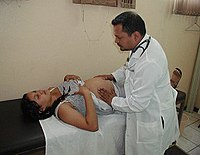
Photo from wikipedia
Early first trimester prenatal counseling could reduce adverse maternal and child health outcomes. Existing literature does not identify the length of time between suspecting pregnancy and attending their first prenatal… Click to show full abstract
Early first trimester prenatal counseling could reduce adverse maternal and child health outcomes. Existing literature does not identify the length of time between suspecting pregnancy and attending their first prenatal visit. Identifying this potential window for change is critical for clinical practice, intervention programming and policy change. The study sample was composed of women in the United States who responded to the Pregnancy Risk Assessment Monitoring Systems survey in 2016, for the following questions—when they first suspected pregnancy, when they attended their first prenatal visit, were they able to receive prenatal care as early as they wished, and perceived barriers to receiving prenatal care. On average, participants became certain they were pregnant at 6.0 (SE = 0.1) weeks gestation, while participants reported having their first prenatal care visit at 9.3 (SE = 0.1) weeks, with clear health disparities by race, age, WIC participation, education level, and marital status. About 15% of women reported not receiving prenatal care as early as they wished. Structural or financial barriers in the health care system were common: 38.1% reported that no appointments available, 28.2% reported not having money or insurance to pay for the visit, 27.3% reported that the doctor or health plan would not start care, and 22.5% reported not having a Medicaid card. This study illustrates a window for opportunity to provide earlier prenatal care, which would facilitate earlier implementation of prenatal counseling. Strategies to address barriers to care on the patient, provider and systemic levels, particularly among vulnerable population groups, are warranted. Seeking prenatal care early is associated with better health outcomes for women and infants. A window of opportunity exists between suspecting pregnancy and attending a first prenatal visit. Clear health disparities were apparent in both recognizing their pregnancies, and receiving early prenatal care by race, age, WIC participation, education level, and marital status. About 15% of women reported not receiving prenatal care as early as they wished, and many attributed this later care to structural or financial barriers in the health care system.
Journal Title: Maternal and Child Health Journal
Year Published: 2021
Link to full text (if available)
Share on Social Media: Sign Up to like & get
recommendations!